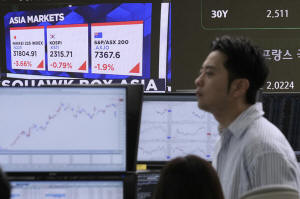World shares fall further, with Tokyo down nearly 4%, as Trump threatens
still more tariff hikes
[April 09, 2025] By
ELAINE KURTENBACH
BANGKOK (AP) — Asian and European shares slid on Wednesday after U.S.
President Donald Trump’s latest tariff hikes took effect and he
threatened to add still more.
Uncertainty is running high about what Trump will do next in his trade
war. In a speech Tuesday night he said plans tariffs on pharmaceuticals
so that more medications would be made in the U.S.
Trump's latest tariffs include a massive 104% levy on U.S. imports of
Chinese products. However, Chinese markets reversed early losses and
gained ground on Wednesday.
Driving the gains were massive share buybacks by big state-run
investment funds and other state companies that often are instructed to
support the market in times of crisis. Investors also are expecting the
government to step up spending and other measures to help counter the
impact of the tariffs, which will hit small manufacturers and traders
that create the most jobs the hardest.
Beijing issued a policy paper reiterating China's right to protect its
businesses with unspecified countermeasures, while it emphasized it
preferred to resolve trade issues through dialogue.
The paper also argued that taking into account trade in services and
U.S. companies’ operations in China, economic exchange between the two
countries is “roughly in balance.”
Hong Kong's Hang Seng rose 0.7%, while the Shanghai Composite index
closed 1.3% higher.
Thailand's benchmark also rose, apparently due to speculation that
Beijing might be preparing to hold talks with the Trump administration.
The unconfirmed rumors helped push the future for the S&P 500 up 0.3%,
while that for the Dow was unchanged.

Elsewhere, markets remained gloomy. Japan's Nikkei 225 closed 3.9%
lower, at 31,714.03 and Prime Minister Shigeru Ishiba convened a meeting
of top financial ministers to reiterate his call for them to do what
they can to mitigate the damage from tariffs to Japanese automakers and
other manufacturers.
Taiwan led the losses in Asia, as its Taiex plunged 5.8%. Big tech
industries were among the biggest decliners. Computer chip giant TSMC
Corp. dropped 3.8% while iPhone maker Hon Hai Precision Industry plunged
10%.
In India, the Sensex declined 0.5% as the central bank cut its benchmark
interest rate, while Bangkok’s SET shed 0.8%.
South Korea’s Kospi lost 1.7% to 2,293.70, and the government said it
would provide help for its beleaguered automakers. The S&P/ASX 200 in
Australia declined 1.8% to 7,375.00. Shares in New Zealand also fell.
[to top of second column] |

Asia markets index of Japan, South Korea and Australia is seen on a
screen as a currency trader works at the foreign exchange dealing
room of the KEB Hana Bank headquarters in Seoul, South Korea,
Wednesday, April 9, 2025. (AP Photo/Ahn Young-joon)
 In early European trading, Germany's
DAX lost 2.4% to 19,796.83. In Paris, the CAC 40 declined 2.4% to
6,930.62. Britain's FTSE 100 gave up 2.2% to 7,735.72.
On Tuesday, the S&P 500 dropped 1.6% after wiping out an early gain
of 4.1%. That took it nearly 19% below its record set in February.
The Dow Jones Industrial Average dropped 0.8%, while the Nasdaq
composite lost 2.1%.
Stocks had rallied globally on Tuesday, with indexes up 6% in Tokyo,
2.5% in Paris and 1.6% in Shanghai. Any optimism or buying
enthusiasm appeared to have dissipated by the time the sharply
higher tariffs became reality.
Analysts say the markets will have more swings up and down given
uncertainty over how long Trump will keep the stiff tariffs on
imports, which will raise prices for U.S. shoppers and slow the
economy. If they persist, economists and investors expect them to
cause a recession. If Trump lowers them through negotiations
relatively quickly, the worst-case scenario might be avoided.
Hope still remains on Wall Street that negotiations may be possible,
which helped drive the morning’s rally. Trump said Tuesday that a
conversation with South Korea’s acting president helped them reach
the “confines and probability of a great DEAL for both countries.”
Trump’s trade war is an attack on the globalization that’s shaped
the world’s economy and helped bring down prices for products on
store shelves but also caused manufacturing jobs to leave for other
countries. Trump has said he wants to narrow trade deficits, which
measure how much more the United States imports from other countries
than it sends to them as exports.
In other dealings early Wednesday, U.S. benchmark crude oil fell
$1.95 to $57.63 per barrel. Brent crude, the international standard,
shed $2.02 to $60.80 per barrel.
The U.S. dollar fell to 145.30 Japanese yen from 146.29 yen. The
euro rose to $1.1035 from $1.0995.
The price of gold rose $74 to $3,063 an ounce.
All contents © copyright 2025 Associated Press. All rights reserved |